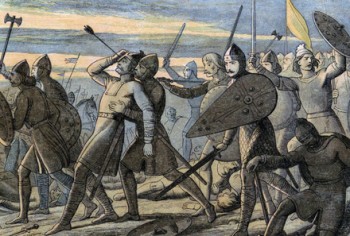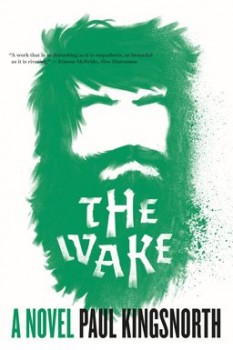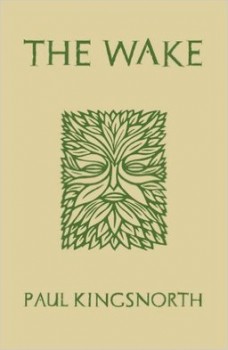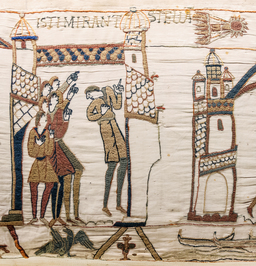The Wake by Paul Kingsnorth
who is thu i can not cnaw
what is angland to thu what is left of angland
i specs i specs
but no man lystens
from The Wake
For nearly four hundred pages Buccmaster of Holland, protagonist of Paul Kingsnorth’s The Wake, speaks — first warning against impending doom, then trying to rally his fellow Englishmen against their Norman conquerors, and always trying to explain and justify himself. Though most people he meets — his tenants, his family, even his fellow guerillas — don’t listen, I did.
Even though he speaks in an amalgam of Old and contemporary English, he speaks forcefully, and I listened to every word, every mad thought, every angry conversation with gods, and every poetic meditation on England. Numerous times I found myself speaking his words aloud, falling into a cadence at once alien and familiar. Alien because it’s an English stripped of nearly every non-Germanic accretion. Familiar because the author’s invented Saxon vernacular feels like it’s exposing some ancient rhythm that’s encoded into the very syntax and syllables of English. This is one of the most immersive and enthralling books I have ever read.
NOTE: Since readers here don’t have the benefit of the book’s glossary and pronunciation guide, I heartily recommend reading out loud the passages I’ve included in this review. Words that look odd will be immediately familiar when spoken aloud.
Buccmaster of Holland, (not the Netherlands, but an old name for part of Lincolnshire) is a socman, a wealthy farmer who owes allegiance not to a local thane, but only to the king. In 1066 he sees two portents of doom for Saxon England. The first is a great black bird with eyes afire and a man’s fingers growing from the tips of its wings. The second is Halley’s Comet, which is reported to have shown as brightly as the moon and was commemorated in the Bayeux Tapestry.
Disaster did strike in the late summer of 1066. First, a Danish army under King Harald Hardrada attacked England in the north just as William of Normandy prepared to invade in the south. The Saxon king, Harold Godwinson, rushed his army north to defeat the Danes and then back south to face the Normans. Weakened by battle with the Danes and exhausted by a forced march, the Saxons were defeated at Hastings, and Harold killed with an arrow to the eye. Historically what followed was ten years of vicious guerilla warfare as the Saxon order was eradicated and replaced by the harsh Norman yoke.
Buccmaster suffers his own loses during the twin invasions. First, his two sons answer King Harold’s call to arms and never return home. Later, when he refuses to pay the new taxes levied by the Normans, his home and village are burned and his wife and the villagers killed. Only his accidental absence saves his life. Fired by his losses, he takes it upon himself to build a force and fight back against the Normans from the wild forests and fens of Lincolnshire.
Kingsnorth calls The Wake a “post-apocalyptic novel set a thousand years ago,” and that’s excellent description. He considers the Norman Conquest and the subsequent decade of guerilla warfare the greatest tragedy to ever befall England. The story is one of endless devastation, from Buccmaster’s home and family to the social order to even the land, as the Normans remake it to their own ends:
we seen a great place of flat ground where the hus of the folcs had been and all around this was a high wall of wud and the top of this wud was scearp and none colde climb it. ofer to the other side of the flat part of the tun rose a great hyll of eorth with steps in it and up these steps climbe many folcs of the ham they tacan things to the top of this hyll where there was an other wall and in it was risan a great torr. locan on as the folcs worced was many frenc on hors with gars and sweords and it colde be seen they was macan these folcs worc though they was not wantan to
this is the deofuls worc saes grimcell and he spec for all

With each passing season the conquerors impose their will, destroying more and more of the Saxon ways. Landowners are dispossessed, and all Saxon bishops are replaced with Norman ones. The North of England is burned down when the remaining free Saxon lords rebel. Buccmaster and his tiny band sneak from forest to fen, never managing to do more than murder a Norman or two, caught lonely and unawares. While news of resistance across the rest of England filters back to Lincolnshire, there is never any telling of victory. However, we know the end; we know that the struggles against the invaders are hopeless.
As a historical novel, meant to recreate a specific time and place in history, The Wake is tremendously successful. Although the language has been modified for readability, the descriptions of the people and their customs are historically accurate, as the book’s lengthy bibliography can attest. Kingsnorth conveys the hardship of living wild in scenes that stink of dirt and blood. And the beauty of the ancient landscape, especially the still wild and undrained Fens, is made palpable in blunt and vivid prose:
while talcan grandfather has been rowan through the undeop darc waters. it is early in the mergen mist is risan from the waters and on the top of the waters is mos grene lic the grenest daeg and deop below deop in the blaec water can be seen great leafs what is suncan almost from sight. all is flat all this land is flat naht stands abuf the reods. low we is and we gan slow through the green and naht is to be seen but the water and any man passan by wolde not cnaw he was any thing but alone here. on efry side the lesch and the saw secg what has leafs what cutts any man felan them. naht but lytel fugols callan naht but water runnan slow
What makes it such a powerful work, though, is the character Buccmaster. From the outset, he is a prideful and arrogant man. The farmers who dismiss his story of the black bird are “dumb lic hunds.” He never fails to remind the reader — and anyone he meets — that he is a socman who owns three oxgangs (approximately 60 acres) and sits on the wapentake (a local court). He hates priests and has contempt for Christians. Around his wife and sons he displays a casual brutality of tongue and hand. Of all the characters we meet, though, he alone seems fully aware of the depth of the horror unfolding across the country, so despite being a repellent man, his words and insights compel you to listen. Through Buccmaster’s telling we feel the suffocation of the gradual and inevitable tightening of the Norman grip around England and her people.
 We are sad witnesses of his disintengration as everything he believes gives him value is taken away. Under the influence of his grandfather Buccmaster rejected Christianity in favor of the old Germanic gods. From when he first spies the black bird he begins to hear a voice in his head that eventually reveals itself to be that of Weland the Smith, a figure from numerous old legends including Beowulf. Weland tells Buccmaster he has been chosen to restore the old ways and kill the Normans. As his faith in Weland grows, Buccmaster becomes more arrogant and less rational. His growing conceit leads him and his band to disaster. It’s never clear whether Weland is real or not, but under his influence a violent side of Buccmaster is let loose.
We are sad witnesses of his disintengration as everything he believes gives him value is taken away. Under the influence of his grandfather Buccmaster rejected Christianity in favor of the old Germanic gods. From when he first spies the black bird he begins to hear a voice in his head that eventually reveals itself to be that of Weland the Smith, a figure from numerous old legends including Beowulf. Weland tells Buccmaster he has been chosen to restore the old ways and kill the Normans. As his faith in Weland grows, Buccmaster becomes more arrogant and less rational. His growing conceit leads him and his band to disaster. It’s never clear whether Weland is real or not, but under his influence a violent side of Buccmaster is let loose.
Buccmaster is the unreliable narrator par excellence. In his own words he is an honorable man, a brave man, and a special man. Kingsnorth skillfully exposes the truth, creating a penetrating portrait of a man who is none of those things, but who possesses the power to hold and captivate his followers and the reader. As Buccmaster gradually unveils his life story the reader learns how he grew to be such a broken man.
For all his seeming madness, his claims to greatness, his failure to ever lead more than a half dozen men in battle, Buccmaster does see what the invasion really means for England and all her people. Kingsnorth’s prose shines throughout the book, but when Buccmaster speaks of what it means to be English and what is being lost, it takes on a dark poignancy.
Buccmaster has a vision of a gold-antlered stag being ridden by a child. The child asks the beast about England and its future:
when will i be free saes the cilde to the stag
and the stag saes thu will nefer be free
then when will angland be free
angland will nefer be free
then what can be done
naht can be done
then how moste i lif
thu moste be triew that is all there is
be triewe
be triewe
Kingsnorth, in addition to having been an environmental and anti-globalist activist, has written at length about the homogenization of England as it loses its local identity to the forces of globalization and statism. We see these contemporary concerns reflected in Buccmaster’s thoughts:
well in the brunnesweald in those time i did not cnaw how fast folcs colde forget what they was i did not cnaw how time worcs did not cnaw that when a great storm cums lic it had cum upon angland then all the feohtan and the ire in the great world cannot put things baec to how they was and sceold be. ah did not cnaw how small man is how weac i did not see that a broc thing can be unbroc only through wantan. but i did see what many folcs now does not see and what yonge cildren of angland now with their frenc haer and frenc names did not efer efen cnaw.
i seen that the names of the folcs of angland was part of anglisc ground lic the treow and rocc the fenn and hyll and i seen that when these names was tacan from the place where they had growan and cast down on other ground and when their place was tacan by names what has not growan from that ground is not of it and can not spec its tunge then a great wrong had been done.
With The Wake, Paul Kingsnorth has written a novel for our own fractured times. Buccmaster, like so many of us today, bases his importance and worth on where he fits into society’s hierarchy. He relies on the order it imposes to give him a sense of purpose. When all that is taken away, he flails about with increasing rage and impotence. That could describe a great number of people across the world today.
Buccmaster gives equal voice to the losses caused by the tragedy of the Norman Conquest a thousand years ago and modern fears of a world unmoored from history and the land. His fears that the Normans will drain the fens, destroying the land his ancestors and he sprang from, presage the ecological disaster we visit on ourselves daily.
Kingsnorth is a founding member of the Dark Mountain Project. It is a group of artists dedicated to creating works that address what they see as a world “entering an age of ecological collapse, material contraction and social and political unravelling.” All these concerns find a voice in The Wake. While the language may seem like work to decipher, its nature forces the reader to make more effort to comprehend and grapple with what is being said.
The Wake is a book I will reread over the coming years. It is a powerful meditation on identity and cultural loss. Kingsnorth’s shadow language, I suspect, is to be truly appreciated by repeated submersion. This is a brilliant book, worthy of all the praise and accolades it receives.
Fletcher Vredenburgh reviews here at Black Gate most Tuesday mornings and at his own site, Swords & Sorcery: A Blog when his muse hits him. You can read some more thoughts on The Wake here.


Thank you Fletcher,
A great review that makes me want to read it, despite the time period not being one of my “typical” favorites 🙂
Cheers,
Anthony
I respect the creativity and effort that goes into this kind of writing, I have great difficulty reading it. I could get through a poem-length (preferably short), but a novel? No.
@Anthony – I don’t think you’ll be disappointed. It’s a powerful work of storytelling and world building.
@RK – I get that. I was a little apprehensive, and tempted to write it off as a gimmick. Once I started,it only took about twenty pages or so before the prose started to flow easily and start singing.
For some reason I’m reminded of nothing so much as Iain Banks’ Feersum Endjinn.
Still, might have to give it a go.
@Joe H – And the funny thing is, I remember being put off by Feersum Endjinn because of the language. Same thing with Riddley Walker by Russell Hoban. After The Wake I should be able to handle either of those easily.
And you should definitely give The Wake a go. It’s one of the best books I’ve read in a very long time.
Been meaning to read this for ages. The passages and your description just made me pull the trigger.
@ilgiallo – Those are the best words I could read in response to this piece. Hope you enjoy it.